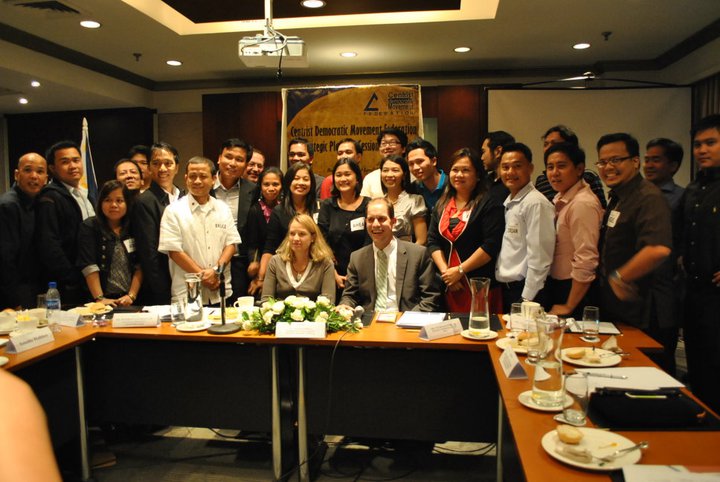Carving the Next Chapter of Federalism in the Philippines

By: Lito C. Lorenzana | October 3, 2013
President at Centrist Democracy Political Institute
2Loves.
2Comments.
0People boxed this.
After more than 333 years of colonization, where are we and what have become of us?
I. Where are we? What have become of us?
From the time the American Colonials technically ended their tutelage and handed over to us our government, we often wondered why the Americans did not pass on the Federal type of government.
They instead ordained for us a highly centralized unitary structure of government dominated by the national government in based in Metro Manila. They also opted to impose a Presidential form of government with the president and vice-president directly elected by the populace but both can come from different parties. They also introduced the universal elections of 24 senators that comprised the upper chamber of Congress.
These modifications to the Philippine Government structure were alien to the experience of the American system which naturally evolved over the 200 years of their Republic after being under British Monarchy for a good part of 300 years.
Tones have been written by political scientists explaining the need for continuing American control over the Islands under the guise of a new republic – but over time – this never did seem to add up.
The Philippines is an archipelagic country, composed of hundreds of islands that have distinct characteristics, with a people coming from different tribes speaking different dialects. The political system imposed on us is not congruent to the nuances of our people.
So thus, a certain dependency to the center of power was established – by design - and to this day, local governments have relatively remained weak and contingent on the patronage.
Local development and self-reliance are stifled by this system of central domination and regulation. Local governments by definition and proximity to the governed should know best the problems & concerns of its citizenry and therefore know the best solutions.
This is a key pillar to the CDP philosophy of governance and this party has taken upon itself to fight for restructuring & reforms and propagate the concepts herein referred to as the Principle of Subsidiarity – leading towards the Centrist Democrats vision of Federalism.
I believe you, young & not so young are in a way familiar with the Cha-Cha or Charter Change. But to further your knowledge on the subject matter, let me impart to you a brief story of our struggle.
II. Federalism in Philippine History
The idea of a Federal Republic of the Philippines is not alien to our political history. It has of course never been an operative reality; nevertheless, our forebears have seriously toyed with the idea. Even before the establishment of the Revolutionary Government of Emilio Aguinaldo in 1898, leaders in Iloilo have planted the seeds of a federal state of Visayas, anticipating the formation of a Philippine Federal Republic with Luzon and Mindanao as its other components. (Coronel, Sheila, Dreaming of Federalism, www.pcij.org. 29July 2005).
According to Resil Mojares (a Cebu-based historian), a group of Filipinos submitted to the Philippine Commission a draft constitution for a Federal Republic of the Philippines which would divide the country into 11 states in 1899. Again in 1900, Isabelo delos Reyes proposed that a federal constitution with seven states be created and named after Filipino heroes (e.g. Burgos for Northern Luzon, del Pilar for Central Luzon, down to Soliman for Mindanao).
The Moros of Mindanao have always asserted their independence from the time the Spanish and later American influence began to filter out to the borders. Blood in fact has flowed freely over the decades in the Mindanao territories partly upholding this concept - not entirely federalist - but more so of self-determination and real autonomy.
In recent history in Mindanao and Visayas, more specifically, from the martial law regime to the early part of the Arroyo administration, federalism has gone forward from the fringe political theorists and adventurists into the mainstream. Nonetheless this has hardly been embraced and given serious space by the media and the movers in the center of government.
The call by President Arroyo for a debate changed all that. It has imbued certain urgency to the issue on federalism and aroused its advocates to its possibilities. It has done the same for its detractors and they too have embarked on a defense against the impending onslaught to a status quo.
The lines were made visibly drawn between those that must protect the privileges of economic and political power in the center and those that have the temerity to attempt to seize a slice of these entitlements.
There were claims that Federalism cannot thrive in the country but it were disproved by the reality that Local Government Units (LGUs) particularly have been champions for self-rule and self-reliance in governance requiring that decisions should be made at the lowest level as possible.
Now, why we need to change this rotten structure to Federalism?
Below is a document from Philip Camara, a federalist that shows the difference between Democracy (Pinatubo) and Plutocracy (Pinatulo). For those who were able to attend the CDP Leadership Trainers Training, I am sure you are familiar with this. We call this the Pinatubo/Pinatulo Principle. This is usually the starting point on his presentation on SUBSIDIARITY – the bottom-up approach.
DEMOCRACY – PINATUBO | PLUTOCRACY – PINATULO |
We, the People | Wealthy Few |
One Person, One Vote | One Peso, One Vote |
Majorities | Markets |
Community-centered | Corporate-centered |
Taxes on the Wealthy | Tax Incentives for the Wealthy Corps |
Information | Propaganda |
Public Schools | Private Schools |
Education | Training |
Studying the arts, literature, history, philosophy, etc. | Mocking people for studying the arts, literature, history, philosophy, etc. |
Public Investment | Private Investment |
Public Transportation | Private Jets |
Accountability | Impunity |
Rule Of Law | Above The Law |
Justice | Just Us |
Transparency | Secrecy |
Sustainable growth | Polluter Growth |
Medicare-For-All | Healthcare For Profit |
Savings Accounts | Offshore Accounts |
Credit Card Debt | Credit Default Swaps |
Union members | Serfs |
Layoffs | Payoffs |
Homies | Cronies |
Grassroots | Golf grass |
Honest Brokers | Self-Interest |
Free Will | At Will |
Citizen | Consumer |
Citizen | Employee |
Participant | Observer |
Actor | Acted On |
Doer | Done To |
Healthy Communities | Gated Communities |
Savings | Debt |
Philippines the beautiful | Philippines, the mining site |
The Many | The Rich |
People | Cogs |
Humanity | Efficiency |
Our response to this is one of the cornerstones of the centrist agenda.
III. Subsidiarity and Decentralization
In the Political Economy, we cannot talk about Federalism without talking about Subsidiarity and Decentralization. These concepts are so intertwined and interrelated that the terms are used to mean the same. But the differences are nonetheless subtle.
As an accepted political theory, SUBSIDIARITY is a “…principle in social organization: functions which subordinate or local organizations perform effectively belong more properly to them than to a dominant central organization.†(Merriam-Webster Dictionary). Moreover, it is an idea that “… a central authority should have a subsidiary function performing only those tasks which cannot be performed effectively at a more immediately of local level…†(Oxford English Dictionary).
The Maastricht Treaty states that SUBSIDIARITY enjoins the institutions of the community to act in areas of concurrent competence “only is and insofar as the objectives if the proposed action cannot be sufficiently achieved…†According to Principle of Subsidiarity, the community institutions should refrain from acting, even when constitutionally permitted to do so, if their objectives could effectively be served by action taken at or below the member state level.
On the other hand, DECENTRALIZATION is really the process of dispersing decision-making governance closer to the people and/or citizen. It includes the dispersal of administration of governance to lower structures.
In DECENTRALIZATION of authority those in national level can focus on more important functions of policy-making, coorÂdination and control because they are dismissed from working into the specifics. There is little danger that the government will become monolithic since people below do not feel isolated. Decentralization also allows speedy and more precise resolutions because decisions are made by those people who are fully aware of the realities of the situation – people from the local.
The concept of DECENTRALIZATION goes beyond merely devolving authority from the center. DECENTRALIZATION is expected make local governments become centers of control on their own.
Over the decades the anecdotal familiarities for both the local leaders and the governed point to their exasperation in dealing with a highly centralized power and authority, vested in the national government in the capital.
Too often, the governed see their local executives spend much of their time and energy seeking the assistance and approval of national government officials. Intuitively they realized that such dependence stifles local initiative and resourcefulness.
The populace may not have understood what subsidiarity, decentralization and federalism mean exactly, but they fully adhere to them and believe the concepts workable.
IV Charter Change and its Need
The decision making process in the decades of the unitary-presidential system has structurally negated the participation of the governed. This anomaly has been so imbedded in the structure that the powers and authorities over time have been so concentrated that they have began to suffocate the system.
By initiating charter change, the current top political leadership of the country may have at last seen the need for a restructuring of our political and economic systems. They may have come to their own conclusions that the decades of the same configuration have constrained our country to deteriorate over time and no longer viable.
The debate on charter change and federalism must go on, and we call for the participation of all. Somehow, this debate must end and a decision must be arrived at. The clamor by the people of the south may just prove to be the impetus for a truly meaningful resolution.
V. Conclusion
By essence, Federalism is an advance form of decentralization. As I have discussed earlier, decentralization is the process of widely distributing decision-making to bring it closer to the point of service or action. Another way to look at it is that “…it asserts the rights of the parts over the whole...â€
Suffice it to say that FEDERALISM is still a very long way off even if imposed under a change in our constitution. But the understanding of subsidiarity and decentralization as workable concepts are the basic stepping stones toward attaining our vision. This response would be realised through a process of surmounting – decentralization - process that is subordinated in an efficient manner to the principle of subsidiarity.
Lito Monico C. Lorenzana
A Seminar on Centrist Democracy and the Roles of Sector Associations in the Political Landscape
Hotel Vicente, F. Torres Street, Davao City September 25, 2012
- More From this Author
- Comments








